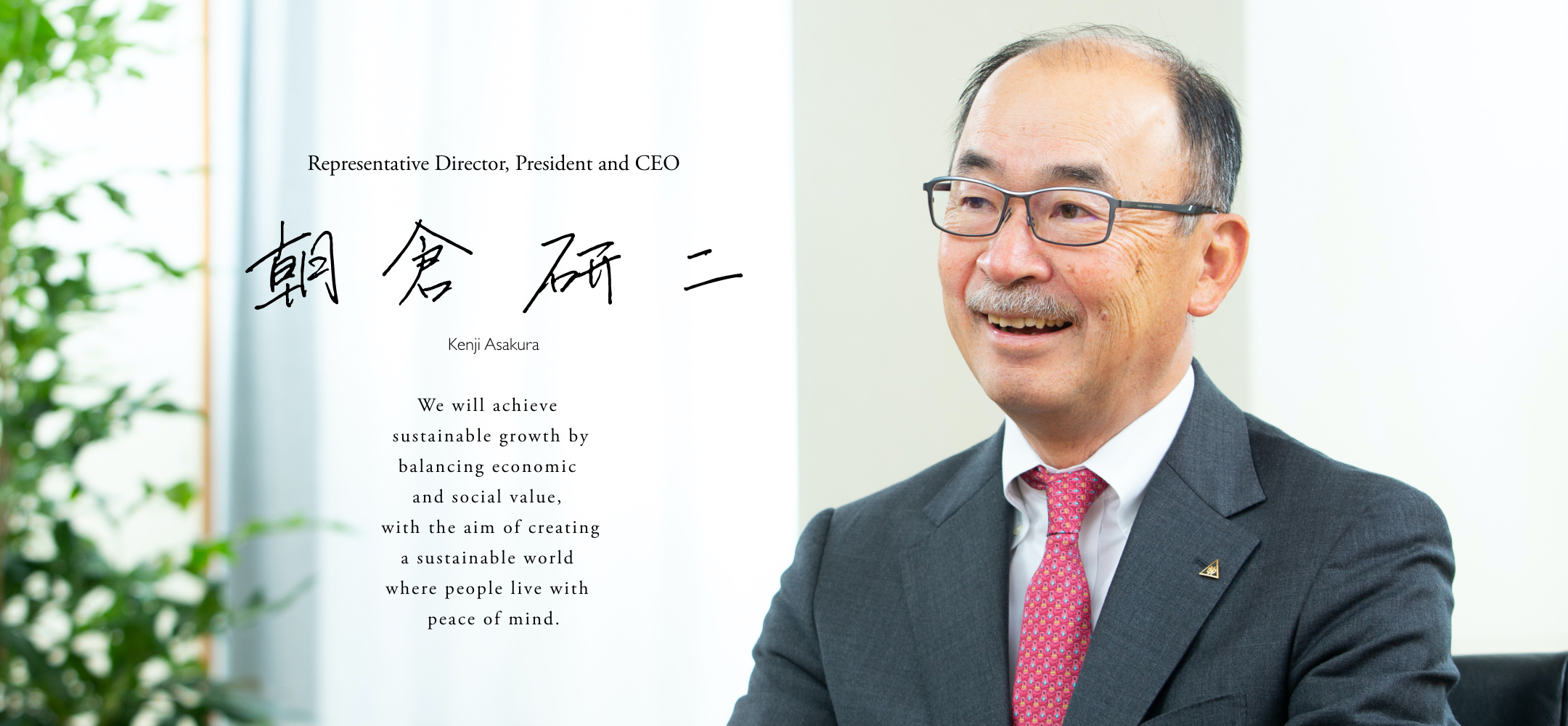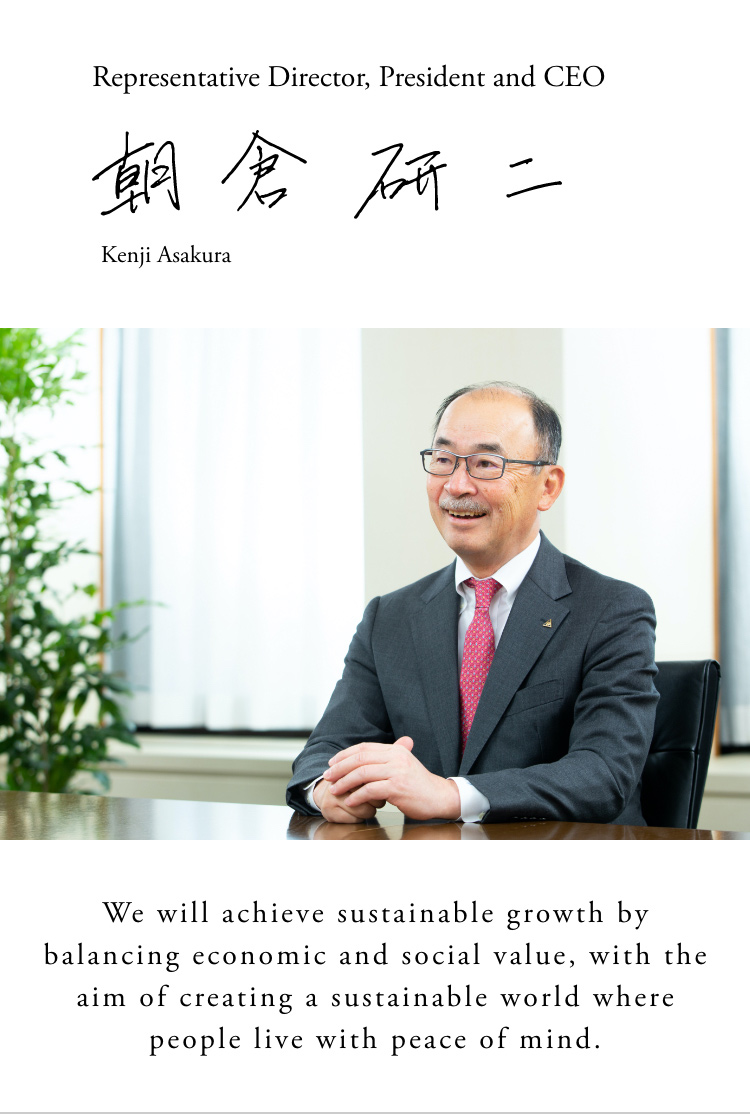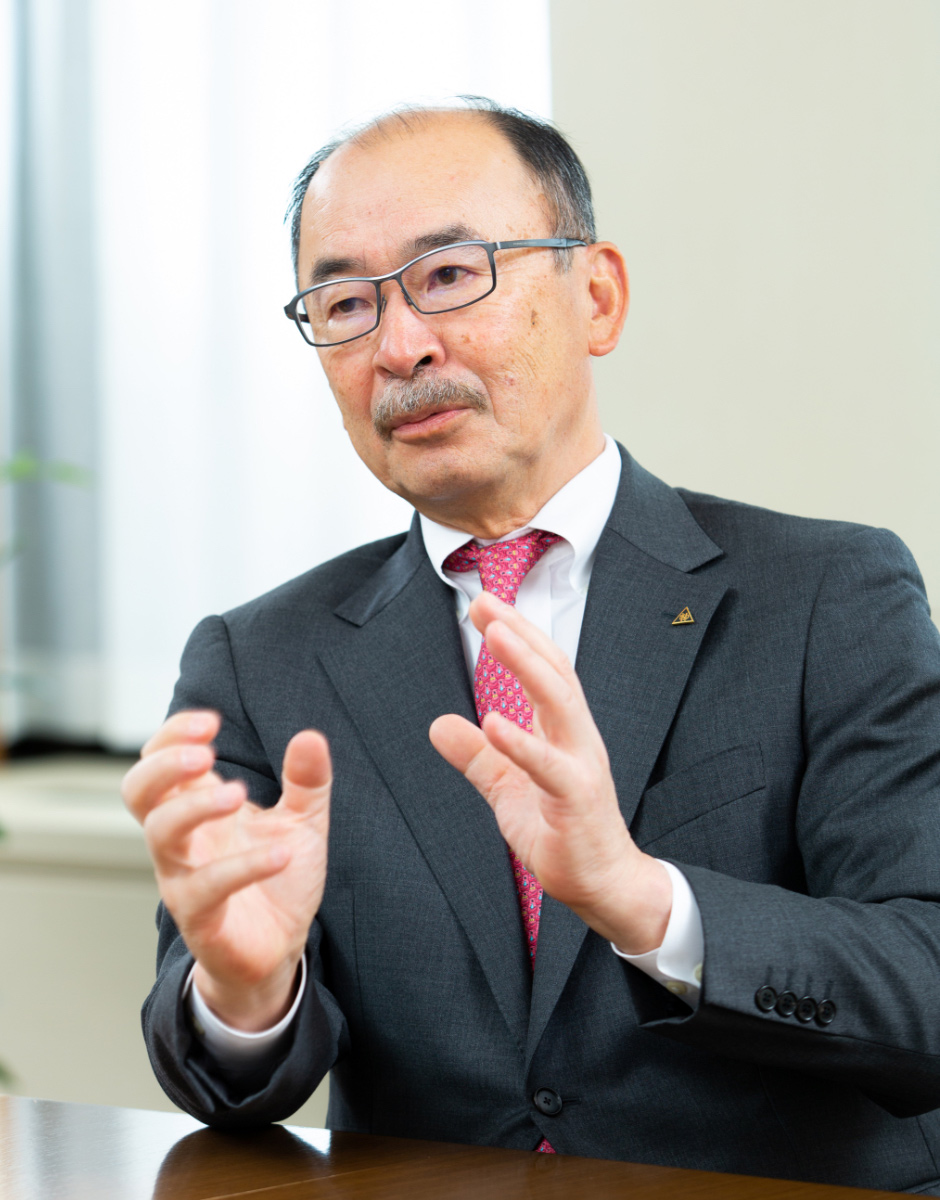CEO Message


The Best Way to Ensure Sustainable Growth Is to Help Solve Social Issues through Our Business Activities
I would be remiss if I did not discuss fiscal 2020 without reflecting on the impact of COVID‑19. There was a dramatic transformation in the social and economic environment. However, I do not think the whole story of this transformation can be explained by COVID‑19. Rather, it seems to me that changes that were supposed to happen a little further ahead in the future were brought forward to the present and occurred all at once. Conditions were uncertain across the board in the first quarter of the fiscal year. However, economic activity in China started to rebound at an early stage, and the NAGASE Group’s business performance also returned to a recovery path.
Currently, the pace of economic recovery varies from region to region. I expect economic activity to gradually return to normal from the second half of fiscal 2021. There has been a lot of talk about the semiconductor shortage in the automobile‑related business, which has a large impact on the NAGASE Group. However, automobile production volume is likely to recover on a full-year basis. I expect performance in the electronics‑related business to hold firm, despite concerns about friction between the U.S. and China. This firm performance will likely be underpinned by demand in the semiconductor‑ and information/communications-related sectors.
In the business environment that lies ahead, the best way to assure our success will surely be to solve social issues. Our customers’ points of view and requests have been changing dramatically. We take the importance of these changes very seriously in our single‑year plan and five‑year new medium‑term management plan. It is imperative that we develop businesses that pave the way for solving social issues. The key issue will be how to make these businesses commercially viable. NAGASE is limited in what it can accomplish alone. I believe that partnerships in various shapes and forms will only continue to increase in importance.
Looking Back on the Previous Medium‑Term Management Plan
Paved the Way for Growth, while Falling Short of Quantitative Targets
The NAGASE Group defined the five‑year period covered by the medium‑term management plan ACE‑2020 as a period of “Reform.” In this sense, I believe that we succeeded in initiating reform.
I would now like to discuss each of the core themes we laid out in the previous medium‑term management plan— “Reform of Profit Structure” and “Reform of Corporate Culture”—in order. First, we delivered a measure of success on the reform of our profit structure. Here, we had two policies: portfolio optimization and expand and strengthen the revenue base. Under the former policy of portfolio optimization, we executed growth investments centered on Life & Healthcare and Electronics, which were classified as focus areas, and steadily expanded the size of those businesses. Our acquisition of U.S.‑based company Prinova Group in 2019 was a major M&A deal that significantly transformed our business portfolio. The acquisition of Prinova Group also improved our geographic portfolio, which had previously been concentrated on Asia. We now have a larger presence in North America and Europe.
Meanwhile, we were unable to achieve our quantitative targets in relation to our policy to expand and strengthen the revenue base, because inorganic growth was insufficient to contribute to our quantitative benchmarks. As top management, I feel deeply responsible for this outcome. Additionally, I commend the Group’s attempts to develop many new businesses over the plan’s five‑year period. However, we learned important lessons. We fell short of targets because of a lack of feasibility for growth investments at the planning stage. On the other hand, we laid the groundwork for businesses that could become core drivers of our business in the future, such as the environment-related business and materials informatics (MI). I see these achievements as positive developments.
The second core theme of the plan was reform of our corporate culture. Here, I highly commend the fact that our younger employees and Group companies centered on manufacturing have taken greater ownership of their duties. In addition, I believe that we managed to shed our former corporate culture, which lacked the tenacity of purpose we need to achieve our goals. I would like to continue to harness these early signs of progress on reforms in the next medium‑term management plan.
Our Aspirations for ACE 2.0
Pursuing Quality to Realize the Ideal NAGASE in 2032
We have formulated a vision for 2032, which marks the 200th anniversary of our founding. It is to become “A Business Designer that Creates a Sustainable Future.” Since my appointment as president, I have continuously used the words “Business Designer” to describe our vision. It expresses our aspirations to become an enterprise that can design businesses with customers through R&D, DX (digital transformation) and manufacturing. We are determined to have NAGASE create new business models without being constrained by the traditional boundaries of a chemicals trading firm or imitating anybody else.
To realize the Ideal NAGASE, we have formulated the new medium‑term management plan ACE 2.0, which covers the five‑year period from fiscal 2021. The previous medium‑term management plan also covered a period of five years. Over the past few years in the latter half of the plan, expectations for companies to create social value have increased rapidly. In these circumstances, we considered whether we should describe the next five years as a “Growth Period” as we had done previously. After careful consideration of the matter, we decided to define the next five years as a period for advancing the “Pursuit of Quality.” Economic and social value is not necessarily completely aligned in the same direction. I believe that one major challenge will be how we will balance economic and social value as we move forward with the plan.
Creating Economic Value and Social Value as a Business Designer

Reforming Our Corporate Culture by Enhancing the “Quality” of Business Activities and Creating Economic and Social Value
We have once again set the core themes of the new medium‑term management plan as reform of our profit structure and corporate culture. This is to ensure that we continue to build on the signs of progress on reforms we saw during the previous medium‑term management plan without interrupting these efforts.
Under reform of our corporate culture, we have formulated three policies. The first policy is the pursuit of economic and social value. As the realization of a sustainable society becomes urgently needed globally, my awareness as a business leader is that companies must not merely strive to grow the top line and expand the size of their businesses. Of course, the NAGASE Group has so far provided value to society through its business activities and worked to realize a sustainable world where people live with peace of mind. Going forward, I believe that, as our future direction, we need to build up an organization and foster a mindset that pursues sustainability even further.
The second policy is to pursue efficiency. We will pursue efficiency in each business activity, including improving capital efficiency and raising the profitability of each business. ROIC (Return on Invested Capital) has been adopted as our indicator of capital efficiency. Based on ROIC calculated in each business, we will analyze and classify businesses into four quadrants defined as the “Improve,” “Base,” “Develop” and “Focus” areas and reconsider our business strategies accordingly. Naturally, if a large number of businesses can be classified as “Develop” and “Focus” area businesses, the Group’s condition will be sounder. However, such an outcome would be unrealistic. In the NAGASE Group’s businesses, the “Base” area businesses are generally strong, and they have allowed the Group to build a stable business portfolio. Meanwhile, the lessons from the previous medium‑term management plan have given us a strong sense of urgency—we must work to develop inorganic businesses. ROIC will be employed as one indicator we will consider when we decide whether to shift existing businesses to “Focus” area businesses.
The third policy is to strengthen human resources to drive reforms. The NAGASE Group views employees as important stakeholders. One of the crucial missions of managers is to raise the quality of the workplace environment so that employees can work positively and enjoyably. If employees can enjoy their work, that enjoyment will be the starting point for providing solutions to customers and growing businesses. I am convinced that this process will ultimately lead to the creation of economic and social value through our business activities.
Drive Reform of Our Profit Structure through Expansion of N‑Sustainable Businesses
As part of the reform of our profit structure, we will carry out the pursuit of profitability and efficiency by implementing company‑wide asset replacement and reallocation of resources. Another priority is to strengthen existing businesses. In addition, we will strive to create sustainable businesses (N‑Sustainable Businesses).
With N‑Sustainable Businesses, our goal is to provide solutions to generate profits through innovative services and technologies, thereby leaving a sustainable future for future generations. Under the previous medium‑term management plan, we adopted the growth of inorganic businesses as a major theme and have been developing new businesses based on this theme. Under ACE 2.0, we have clearly stated our intention to develop new businesses by providing new value that solves social and environmental issues with a particularly strong focus on sustainability. Our operating income target for N‑Sustainable Businesses in five years is ¥5.0 billion, which represents around 15% of total operating income. This target will not be easy to achieve. However, I believe that achieving it will lay a crucial foundation for realizing the Ideal NAGASE.
We have established the three N‑Sustainable Business fields: Environment and Energy, Next‑generation Communications, and Life & Healthcare. We are not starting any of these fields completely from scratch. For example, Life & Healthcare includes continuous activities and businesses that have newly started, such as initiatives in the food ingredients business and the biotechnology field. Each field offers opportunities for the NAGASE Group to work as an agency or do work that involves manufacturing. There are also opportunities to introduce XaaS (X as a Service) business models, which provide what is known as the consumption of experience. An example of this is TABRASA™, which is a new materials search platform using AI. NAGASE possesses a global network that it has developed through its business in the chemical industry, and it is also well versed in technology. I believe it is crucial for NAGASE to maximize these strengths and contribute to society.
Looking ahead, we will strengthen our investment in businesses positioned in the three N‑Sustainable Business fields. A wide range of investment decision‑making criteria other than ROIC are conceivable, including prospects for the future and relevance to social and environmental issues. On the investment front, I believe that our awareness will change markedly compared with our traditional approaches to investing.
Supporting Our Two Reforms with Acceleration of Digital Transformation (DX) and Promotion of Sustainability
We will work to strengthen three functions supporting our two reforms. The three functions are (1) Accelerate DX further, (2) Promote sustainability, and (3) Strengthen corporate functions.
Looking at DX, we will not make DX itself the goal. Instead, we see it as a tool that will ensure that we conduct sustainable corporate business activities into the future. With that said, our priority is to build a unique DX platform for NAGASE, instead of merely introducing ordinary digital technology available anywhere.
One of these initiatives is digital marketing. Agency busi ‑ ness, which has been NAGASE’s core operation, will certainly decline going forward. I believe that digital marketing is the essential measure we must implement to address this crisis. Digital marketing refers to more than just e‑commerce, where people buy and sell goods online. Digital marketing will serve as a basis for expanding our interfaces with markets in supply chains, identifying needs, and providing solutions that are unique to NAGASE.
From this perspective too, I believe that TABRASA™ has a pivotal role to play. I have high hopes that TABRASA™ will help to expand our solution proposals by allowing NAGASE to do things such as find and manufacture new materials needed by customers. As for future DX, we can expect to propose DX as a service, as we have done with TABRASA™, and to provide DX to realize safe and secure supply chains using blockchain technology. By collaborating with partner companies through such initiatives, I believe that we can make an immense contribution to the solution of social and environmental issues.
We see our efforts to promote sustainability as a long road that will continue indefinitely without ending during the period covered by ACE 2.0. NAGASE newly formulated the Sustainability Basic Policy in February 2021. In June 2020, we launched a Sustainability Committee, on which I serve as Chair. Within the committee, we have been conducting lively discussions with the leaders of Group companies in Japan and overseas and research organizations. The process of clearly identifying stakeholders and defining materiality for each type of stakeholder was a major learning opportunity. Specific non‑financial targets will be formulated within the current fiscal year. I believe that it is crucial to make steady strides on this priority, including raising awareness within the Group, without hastily rushing through the discussions.
It Is Precisely Because We Are in a Fast‑Changing Business Environment that We Must Always Maintain the Highest Standards of Integrity
The COVID‑19 pandemic has been causing unprecedented changes. Under these conditions, I now keenly appreciate the importance of reaffirming our Management Philosophy— maintain the highest standards of integrity. Even in these trying circumstances, if we put this philosophy at the heart of our business activities and communication with stakeholders, I am convinced that things are sure to eventually head in the right direction. It is precisely because of these circumstances that I would like NAGASE to make a company‑wide effort to cherish our management philosophy of maintaining the highest standards of integrity.
Looking ahead, guided by this universal management philosophy, all Group employees will make a concerted effort to realize a sustainable world where people live with peace of mind. I cordially ask for your continued understanding and support as we endeavor to reach our goals
Integrated Report 2021
Download All Pages
Download Separate Files
Story for Value Proposition of the NAGASE Group(2.2MB)
Overview of Our Value Creation Story | Our Social Significance | History of Value Creation | Our Business Model | Important Management Resources | Our Risks and Opportunities | [Feature] New Business Looking to the Future | Our Sustainability Management
CEO Message | CFO Message | Business Model Evolution Looking to the Future | Shaping Value 1: Reform of Profit Structure | Shaping Value 2: Reform of Corporate Culture | Shaping Value 3: Corporate Functions Supporting Reform
List of Businesses | Functional Materials Segment | Advanced Materials & Processing Segment | Electronics & Energy Segment | Mobility Segment | Life & Healthcare Segment | Regional Strategy
Sustainability Management(1.8MB)
Our Board | Corporate Governance | Interview with the Outside Directors | Compliance | Risk Management & Responsible Publicity and Marketing | Human Resource Development to Drive Innovation | Creating Environmental Value | Human Rights and Labor Management, Vibrant Work Environments & Responsible Supply Chain | Social Contribution Activities
11-Year Financial Highlights | Financial Information | Consolidated Subsidiaries, Affiliates and Offices | Investor Information | Corporate Information



